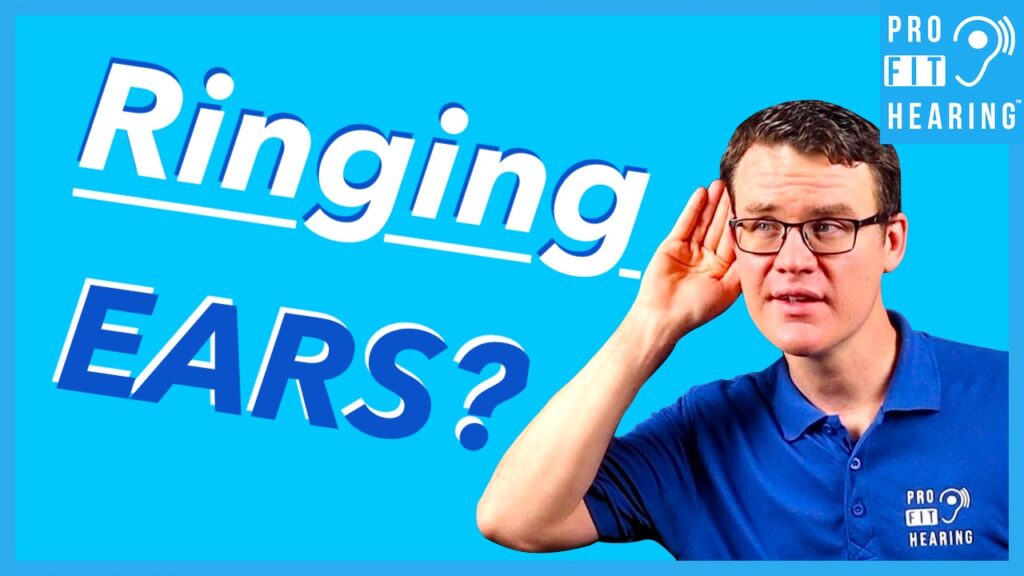Tinnitus Causes – What is Tinnitus/Noise in My Head?

What is tinnitus or noise in my head? It’s also called ringing in the ears. Today, I’ll discuss possible tinnitus causes.
SUBSCRIBE to our YouTube channel for weekly videos!
Hi, I’m Dr. Derek – audiologist, audio engineer, and musician with ProFitHearing.com bringing you the best insight in today’s latest hearing aids, headphones, and audio technology to improve your life. If you have concerns about your hearing, always consult with your local physician or audiologist.
If you’re interested in hearing aids, check out my free eBook HERE.
Tinnitus Defined
Tinnitus may also be referred to as noise in your head, buzzing, or ringing in the ears. It’s a sound that only the person with tinnitus hears. It’s not from sounds occurring in your environment around you. Tinnitus may be only noticed occasionally, or it could be a sound that you hear constantly. You may hear it in one or both ears, or you may feel like it sounds like it’s in your head. Tinnitus is usually more obvious when you’re in quiet places.
First, if you have tinnitus consult with a physician and audiologist for evaluation. Your provider can make recommendations on how to best treat tinnitus once the cause is determined. Now, let’s talk about possible tinnitus causes.
Tinnitus Causes
#1: Earwax build-up
Do you have a build-up of wax in your ears? Have your physician take a look in both ears, and ask for an ear cleaning if needed. Earwax makes existing tinnitus more noticeable because it reduces the volume of sounds around you. Those environmental sounds may have otherwise helped cover up tinnitus.
#2: Sensorineural hearing loss
Sensorineural hearing loss is permanent damage to the hair cells inside the ear and varies in severity from mild to profound. This hair cell damage can be a cause of tinnitus. You may even experience tinnitus when your hearing test results are in a normal range. Your hearing may have declined but still be within normal range from -10 to 25 dB for adults, or there may be hearing loss in the high frequencies above the typically measured 8000 Hz.
#3: Noise exposure
Excessive noise can cause sensorineural hearing loss over time and lead to tinnitus. You may even notice that your ears ring after a loud concert. If so, make sure to avoid loud sound or wear hearing protection like earplugs or earmuffs. Your ears may ring right after a loud concert and then stop, however repeated exposure to loud noise can cause tinnitus to return and not go away.
#4: Eardrum rupture
Any time there is a hole in the eardrum and sound is not transmitting into the ear normally, there can be hearing loss and tinnitus may be more noticeable. An eardrum rupture may heal on its own or be patched by an Ear Nose and Throat (ENT) physician. See your physician if you experience any ear pain or suspect an ear infection or eardrum rupture.
#5: Otosclerosis
This is an abnormal bone growth in the middle ear that causes conductive hearing loss. This restricts how sound transmits through the ear, so tinnitus may be more noticeable.
#6: Eustachian tube dysfunction, ear infection, or middle ear fluid
The Eustachian tube regulates air pressure inside the middle ear. If this tube does not open and close regularly or if there are any other disruptions to the middle ear like an ear infection or fluid, this can negatively affect your hearing and you may notice tinnitus. An Ear Nose and Throat (ENT) physician can treat this condition.
#7: Cardiovascular problems like high blood pressure, atherosclerosis
Your physician can diagnose these conditions and provide guidance on how to best treat them. Think about when your tinnitus first began and talk with your physician to see if there is a relationship between your tinnitus and these health conditions.
Now, if you’re finding value from this post so far please share it and comment below if you have any questions or other topics you’d like to know more about.
#8: Ototoxic medications
Any medication that is ototoxic, meaning toxic to the inner ear, may cause sensorineural hearing loss and tinnitus. Make sure to ask your physician if you experience any tinnitus or hearing changes after taking medication.
#9: Muscle spasms in the middle ear
The middle ear is where the eardrum and ear bones are located. Any changes in the function of the middle ear can make tinnitus more noticeable.
#10: Acoustic neuroma
An acoustic neuroma is a tumor pressing against hearing and balance nerves. This can negatively impact hearing and balance and also be a cause of tinnitus.
#11: TMJ (temporomandibular joint disorder)
TMJ can cause pain in the joint connecting the jaw and skull. It can also be related to tinnitus. Consult with your physician or dentist for more guidance on this condition.
#12: Inner ear disorders like Meniere’s and Labyrinthitis
Meniere’s symptoms include tinnitus, hearing loss, vertigo/dizziness, and fullness in one ear. Labyrinthitis can include tinnitus, hearing loss, and vertigo/dizziness as well. Any disorder affecting the inner ear can cause tinnitus.
#13: Concussion/traumatic brain injury (TBI)
Any head injury needs immediate medical attention. Tinnitus onset could be related to this injury.
#14: Head or neck injury
Did you have a recent injury or accident with tinnitus following? Make sure to be evaluated by a physician ASAP.
Tinnitus Causes – Next Steps
Remember that if you experience tinnitus, consult with your physician to rule out any medical cause. An audiologist can evaluate your hearing to determine if hearing loss exists. Your provider can assist you in treatment of the symptoms you experience. If you’re a hearing aid candidate, there are many options available to help treat tinnitus as well as hearing loss. If you’re interested in learning more about today’s latest hearing aid technology, go to https://www.youtube.com/profithearing and check out all the videos on our YouTube channel.
-Dr. Derek
Tinnitus App Info -> https://www.profithearing.com/ringing-in-ears-widex-zen-tinnitus-app/
